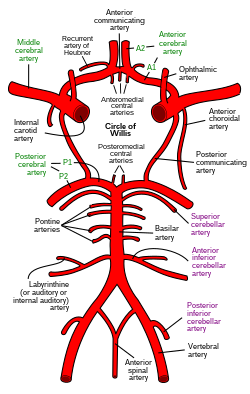Partial anterior circulation infarct

Editor-In-Chief: Prab R Tumpati, MD
Obesity, Sleep & Internal medicine
Founder, WikiMD Wellnesspedia &
W8MD's medical weight loss NYC, sleep center NYC
Philadelphia medical weight loss and Philadelphia sleep clinics
| Partial anterior circulation infarct | |
|---|---|

| |
| Synonyms | PACI |
| Pronounce | N/A |
| Specialty | Neurology |
| Symptoms | Hemiparesis, dysphasia, hemianopia |
| Complications | Stroke, cognitive impairment |
| Onset | Sudden |
| Duration | Variable |
| Types | N/A |
| Causes | Thrombosis, embolism |
| Risks | Hypertension, diabetes mellitus, smoking, hyperlipidemia |
| Diagnosis | CT scan, MRI, clinical examination |
| Differential diagnosis | Total anterior circulation infarct, lacunar stroke, posterior circulation infarct |
| Prevention | N/A |
| Treatment | Thrombolysis, antiplatelet therapy, rehabilitation |
| Medication | N/A |
| Prognosis | Variable, depends on severity and treatment |
| Frequency | Common |
| Deaths | N/A |
Partial Anterior Circulation Infarct (PACI) is a type of ischemic stroke that occurs when the blood supply to part of the anterior circulation of the brain is reduced or interrupted. The anterior circulation is supplied by the internal carotid arteries, which branch into the middle cerebral artery (MCA) and the anterior cerebral artery (ACA). PACI typically involves areas of the brain supplied by these arteries, which can affect the frontal, parietal, and temporal lobes, leading to a variety of neurological deficits.
Causes[edit]
PACI is most commonly caused by atherosclerosis, where plaque buildup narrows the arteries, reducing blood flow. Other causes include cardiac embolism, where a clot formed in the heart travels to the brain, and small vessel disease, affecting the brain's smaller arterial vessels. Risk factors mirror those of other types of stroke, including hypertension, diabetes mellitus, smoking, and atrial fibrillation.
Symptoms[edit]
Symptoms of PACI can vary widely depending on the specific brain areas affected but generally include weakness or paralysis on one side of the body (hemiparesis), difficulty speaking or understanding language (aphasia), and visual disturbances. Patients may also experience confusion, difficulty with coordination and balance, and severe headaches.
Diagnosis[edit]
Diagnosis of PACI involves a combination of clinical assessment and imaging techniques. Magnetic resonance imaging (MRI) or computed tomography (CT) scans are used to visualize the brain and identify areas of infarction. Additional tests, such as carotid ultrasound, echocardiography, and blood tests, are performed to determine the underlying cause of the stroke.
Treatment[edit]
Treatment for PACI aims to restore blood flow to the affected area of the brain as quickly as possible. This may involve the use of clot-busting drugs (thrombolysis), mechanical removal of the clot (thrombectomy), or procedures to prevent further clot formation (anticoagulation therapy). Rehabilitation, including physical, occupational, and speech therapy, is crucial for recovery and maximizing the patient's functional abilities.
Prognosis[edit]
The prognosis for individuals with PACI varies. Factors influencing recovery include the size and location of the infarct, the patient's overall health, and the timeliness of treatment initiation. While some patients may experience significant recovery, others may have lasting disabilities.
Prevention[edit]
Prevention of PACI involves managing risk factors for stroke. This includes controlling blood pressure, managing diabetes, quitting smoking, maintaining a healthy weight, and regular exercise. In some cases, medications to reduce blood clot risk or surgery to remove plaque buildup in the arteries may be recommended.
Ad. Transform your life with W8MD's Budget GLP-1 injections from $75


W8MD offers a medical weight loss program to lose weight in Philadelphia. Our physician-supervised medical weight loss provides:
- Weight loss injections in NYC (generic and brand names):
- Zepbound / Mounjaro, Wegovy / Ozempic, Saxenda
- Most insurances accepted or discounted self-pay rates. We will obtain insurance prior authorizations if needed.
- Generic GLP1 weight loss injections from $75 for the starting dose.
- Also offer prescription weight loss medications including Phentermine, Qsymia, Diethylpropion, Contrave etc.
NYC weight loss doctor appointmentsNYC weight loss doctor appointments
Start your NYC weight loss journey today at our NYC medical weight loss and Philadelphia medical weight loss clinics.
- Call 718-946-5500 to lose weight in NYC or for medical weight loss in Philadelphia 215-676-2334.
- Tags:NYC medical weight loss, Philadelphia lose weight Zepbound NYC, Budget GLP1 weight loss injections, Wegovy Philadelphia, Wegovy NYC, Philadelphia medical weight loss, Brookly weight loss and Wegovy NYC
|
WikiMD's Wellness Encyclopedia |
| Let Food Be Thy Medicine Medicine Thy Food - Hippocrates |
Medical Disclaimer: WikiMD is not a substitute for professional medical advice. The information on WikiMD is provided as an information resource only, may be incorrect, outdated or misleading, and is not to be used or relied on for any diagnostic or treatment purposes. Please consult your health care provider before making any healthcare decisions or for guidance about a specific medical condition. WikiMD expressly disclaims responsibility, and shall have no liability, for any damages, loss, injury, or liability whatsoever suffered as a result of your reliance on the information contained in this site. By visiting this site you agree to the foregoing terms and conditions, which may from time to time be changed or supplemented by WikiMD. If you do not agree to the foregoing terms and conditions, you should not enter or use this site. See full disclaimer.
Credits:Most images are courtesy of Wikimedia commons, and templates, categories Wikipedia, licensed under CC BY SA or similar.
Translate this page: - East Asian
中文,
日本,
한국어,
South Asian
हिन्दी,
தமிழ்,
తెలుగు,
Urdu,
ಕನ್ನಡ,
Southeast Asian
Indonesian,
Vietnamese,
Thai,
မြန်မာဘာသာ,
বাংলা
European
español,
Deutsch,
français,
Greek,
português do Brasil,
polski,
română,
русский,
Nederlands,
norsk,
svenska,
suomi,
Italian
Middle Eastern & African
عربى,
Turkish,
Persian,
Hebrew,
Afrikaans,
isiZulu,
Kiswahili,
Other
Bulgarian,
Hungarian,
Czech,
Swedish,
മലയാളം,
मराठी,
ਪੰਜਾਬੀ,
ગુજરાતી,
Portuguese,
Ukrainian
